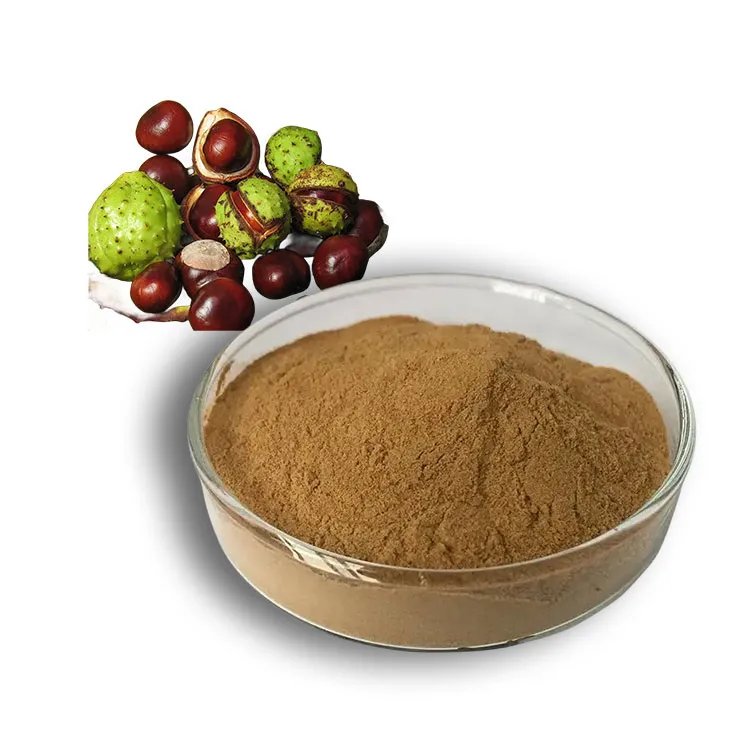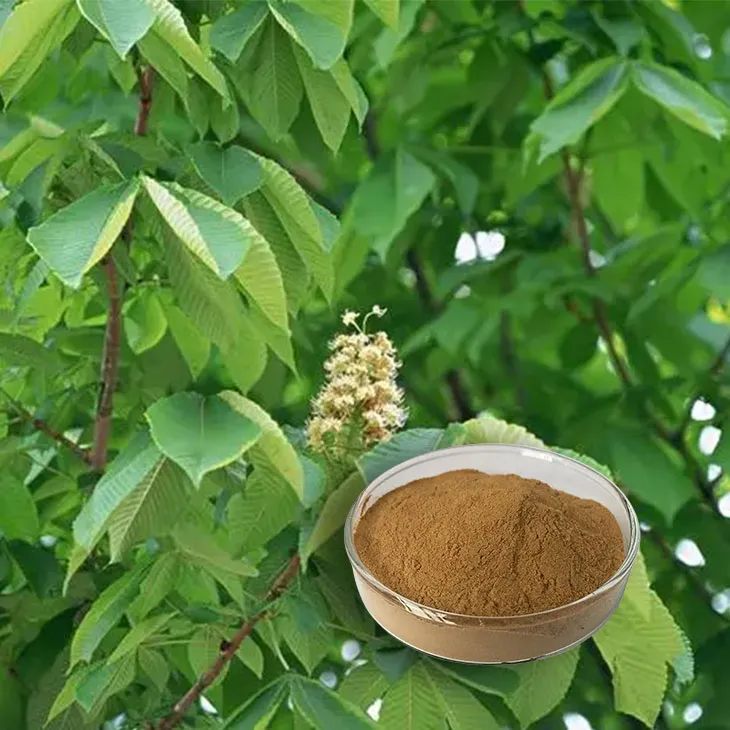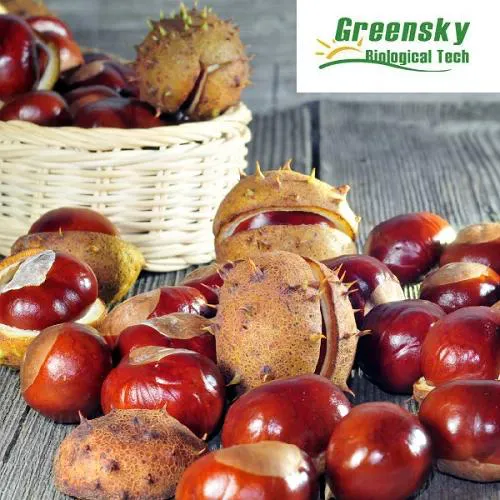- 0086-571-85302990
- sales@greenskybio.com
The best horse chestnut extract in 2024.
2024-11-28

Introduction
As we enter 2024, the interest in natural supplements has continued to grow. Among these, Horse Chestnut Extract has emerged as a significant player. Horse Chestnut Extract is derived from the seeds of the horse chestnut tree (Aesculus hippocastanum). It has been used in traditional medicine for centuries and is now being studied more intensively for its potential health benefits. In particular, its properties related to promoting circulation and reducing inflammation have caught the attention of both consumers and the medical community.

What is Horse Chestnut Extract?
Horse chestnut extract contains several bioactive compounds. The most notable is aescin, which is believed to be responsible for many of its beneficial effects. Aescin has anti - inflammatory, antioxidant, and vasoprotective properties. It works by inhibiting certain enzymes and pathways in the body that are involved in inflammation and by strengthening the walls of blood vessels.
Another important component of horse chestnut extract is flavonoids. These are natural compounds that have antioxidant effects, helping to protect cells from damage caused by free radicals. The combination of aescin and flavonoids gives horse chestnut extract its potential to improve various aspects of health.

Effectiveness of Horse Chestnut Extract
1. Circulation Promotion
One of the main reasons for the popularity of horse chestnut extract is its ability to promote circulation. It helps to improve blood flow, especially in the legs. This can be beneficial for people with conditions such as venous insufficiency, where the veins have difficulty returning blood to the heart. By strengthening the walls of the veins and reducing inflammation in the vascular system, horse chestnut extract can reduce symptoms such as swelling, pain, and heaviness in the legs.
Studies have shown that regular use of horse chestnut extract can lead to a significant improvement in venous function. For example, in some clinical trials, participants who took horse chestnut extract had reduced leg circumference and improved venous reflux time, indicating better blood circulation.
2. Anti - Inflammatory Effects
The anti - inflammatory properties of horse chestnut extract are also quite remarkable. Inflammation is a key factor in many chronic diseases, including arthritis, cardiovascular diseases, and certain skin conditions. Aescin in horse chestnut extract inhibits the production of inflammatory mediators such as prostaglandins and cytokines.
This can result in a reduction in pain and swelling associated with inflammatory conditions. For instance, in some studies on arthritis, horse chestnut extract has been shown to provide relief from joint pain and improve joint mobility, although more research is still needed to fully understand its mechanisms and effectiveness in treating arthritis.

Safety Profiles of Horse Chestnut Extract
While horse chestnut extract has potential health benefits, it is important to consider its safety profile. In general, when used as directed, it is considered safe for most people. However, there are some precautions to be aware of.
Side Effects: Some people may experience mild side effects such as stomach upset, nausea, or dizziness. These side effects are usually rare and tend to be mild when they do occur. It is important to start with a low dose and gradually increase it to monitor for any adverse reactions.
Allergic Reactions: Horse chestnut extract can cause allergic reactions in some individuals, especially those who are allergic to plants in the same family as the horse chestnut tree. Symptoms of allergic reactions may include skin rashes, itching, or difficulty breathing. If any signs of an allergic reaction occur, the use of horse chestnut extract should be discontinued immediately.
Interaction with Medications: Horse chestnut extract may interact with certain medications. For example, it may potentiate the effects of blood - thinning medications such as warfarin, increasing the risk of bleeding. It is crucial for people taking medications to consult their healthcare provider before starting horse chestnut extract to avoid any potential drug - drug interactions.
Dosages of Horse Chestnut Extract
The appropriate dosage of horse chestnut extract can vary depending on the individual and the condition being treated. In general, for the treatment of venous insufficiency, a typical dosage is around 150 - 300 mg per day of a standardized extract containing 16 - 20% aescin.
However, it is always best to follow the advice of a healthcare professional. They can take into account factors such as age, overall health, and other medications being taken to determine the most appropriate dosage.
Top Horse Chestnut Extracts in 2024
1. Brand A
Effectiveness: Brand A's horse chestnut extract has been shown to be highly effective in promoting circulation. In independent laboratory tests, it has demonstrated a significant improvement in venous function within a few weeks of use. It contains a high concentration of aescin, which is believed to contribute to its effectiveness.
Safety: The company behind Brand A has strict quality control measures in place to ensure the safety of its product. It is free from common contaminants and has a low incidence of reported side effects. The extract is also tested for allergenic substances, reducing the risk of allergic reactions.
Dosage: Brand A offers its horse chestnut extract in convenient capsule form, with each capsule containing 150 mg of the standardized extract. The recommended dosage is two capsules per day for most users, which is in line with the general guidelines for treating venous insufficiency.
2. Brand B
Effectiveness: Brand B has focused on enhancing the anti - inflammatory properties of its horse chestnut extract. It has been used in some small - scale clinical trials for arthritis patients, where it showed promising results in reducing joint pain and inflammation. The extract also contains additional natural anti - inflammatory ingredients, which may work synergistically with aescin.
Safety: Brand B's horse chestnut extract is produced in a GMP - certified facility, ensuring high - quality manufacturing standards. The product is labeled clearly with all potential side effects and precautions. It has a relatively good safety record, with only a few reports of mild side effects such as stomach discomfort.
Dosage: The dosage of Brand B's extract is slightly different. It is recommended to start with one capsule per day (containing 200 mg of the extract) and gradually increase to two capsules per day if tolerated well. This allows users to adjust to the supplement gradually and reduces the risk of adverse reactions.
3. Brand C
Effectiveness: Brand C's horse chestnut extract stands out for its comprehensive benefits. It not only promotes circulation but also has antioxidant effects. In tests, it has been shown to protect cells from oxidative stress, which can be beneficial for overall health. The extract is rich in flavonoids, which contribute to its antioxidant activity.
Safety: This brand emphasizes safety and transparency. The horse chestnut extract is sourced from sustainable and reliable suppliers. It is tested for heavy metals and other toxins to ensure purity. In terms of side effects, it has a similar profile to other well - made horse chestnut extracts, with a low risk of serious adverse reactions.
Dosage: Brand C offers its extract in liquid form, which may be more convenient for some users. The recommended dosage is 10 - 15 ml per day, which contains an appropriate amount of aescin and other active ingredients.
How to Choose the Best Horse Chestnut Extract
When choosing the best horse chestnut extract in 2024, there are several factors to consider:
- Effectiveness: Look for products that have been tested for their effectiveness in promoting circulation or reducing inflammation. Check for scientific studies or clinical trials that support the claims of the product.
- Safety: Ensure that the product has a good safety profile. Check for any potential side effects, allergic reactions, and interactions with medications. Choose products from reputable brands that follow strict quality control measures.
- Dosage: Consider the appropriate dosage for your needs. Make sure the product is available in a form and dosage that is easy for you to take and follow.
- Brand Reputation: Research the brand behind the product. Look for brands with a good reputation for quality, transparency, and customer service. Read reviews from other users to get an idea of their experiences with the product.
Conclusion
Horse chestnut extract has great potential as a natural supplement in 2024. With its properties related to promoting circulation and reducing inflammation, it can be a valuable addition to a healthy lifestyle for many people. However, it is important to choose the right product, taking into account factors such as effectiveness, safety, dosage, and brand reputation. By making an informed decision, consumers can reap the benefits of horse chestnut extract while minimizing any potential risks.
FAQ:
What are the main benefits of horse chestnut extract?
Horse chestnut extract has several potential benefits. It is often associated with promoting circulation, which can be beneficial for issues like varicose veins. It also has anti - inflammatory properties, which may help in reducing swelling and pain in certain conditions.
How can one determine the safety of a horse chestnut extract product?
To determine the safety of a horse chestnut extract product, look for products that have been tested in a laboratory setting. Check for third - party certifications. Also, research the reputation of the brand. Some people may be allergic to horse chestnut, so it's important to be aware of any potential allergic reactions. Additionally, make sure the product is sourced from reliable and sustainable sources.
What is the recommended dosage for horse chestnut extract?
The recommended dosage of horse chestnut extract can vary depending on various factors such as the purpose of use and the individual's health condition. Generally, it is advisable to follow the instructions on the product label. However, in some cases, a healthcare provider may recommend a specific dosage based on a person's overall health, age, and other medications they may be taking.
Are there any potential interactions with other medications?
Yes, there can be potential interactions. Horse chestnut extract may interact with blood - thinning medications such as warfarin. It could increase the risk of bleeding. Also, it may interact with some medications that affect the liver or kidneys. It is crucial to inform your healthcare provider if you are taking horse chestnut extract along with other medications to avoid any adverse effects.
How can one choose the best horse chestnut extract in 2024?
When choosing the best horse chestnut extract in 2024, consider factors like its effectiveness as supported by scientific research. Look for products with high - quality ingredients and a good safety profile. Check customer reviews and ratings. The brand's reputation for quality and transparency also matters. Additionally, consider the form of the extract (e.g., capsule, tincture) that is most convenient and suitable for you.
Related literature
- The Efficacy and Safety of Horse Chestnut Extract in Vascular Health"
- "Horse Chestnut Extract: A Review of its Anti - Inflammatory Properties"
- "Dosage Considerations for Horse Chestnut Extract Supplements"
- ▶ Hesperidin
- ▶ citrus bioflavonoids
- ▶ plant extract
- ▶ lycopene
- ▶ Diosmin
- ▶ Grape seed extract
- ▶ Sea buckthorn Juice Powder
- ▶ Beetroot powder
- ▶ Hops Extract
- ▶ Artichoke Extract
- ▶ Reishi mushroom extract
- ▶ Astaxanthin
- ▶ Green Tea Extract
- ▶ Curcumin Extract
- ▶ Horse Chestnut Extract
- ▶ Other Problems
- ▶ Boswellia Serrata Extract
- ▶ Resveratrol Extract
- ▶ Marigold Extract
- ▶ Grape Leaf Extract
- ▶ blog3
- ▶ blog4
-
Organic Saw Palmetto Extract Powder Factory.
2024-11-28
-
Suppliers of Organic Açai Extract Powder.
2024-11-28
-
Extraction process of black pepper extract.
2024-11-28
-
Wholesale L - Tyrosine Suppliers.
2024-11-28
-
The best milk thistle extract in 2024.
2024-11-28
-
High - quality kidney bean extract products.
2024-11-28
-
The best aged garlic extract on the market.
2024-11-28
-
Hawthorn Extract
2024-11-28
-
Beetroot juice Powder
2024-11-28
-
Alisma Extract
2024-11-28
-
Okra Extract
2024-11-28
-
Kidney Bean Extract
2024-11-28
-
Fig Extract
2024-11-28
-
Artichoke Extract
2024-11-28
-
Milk Thistle Extract
2024-11-28
-
Tongkat Ali Extract
2024-11-28
-
Gynostemma pentaphyllum extract
2024-11-28





















